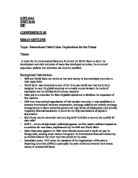The Development Loan Fund, founded, sponsored, and funded by the Central Intelligence Agency’s Center For International Affairs at Massachusetts Institute of Technology, resulted primarily from the efforts and concerns expressed by Dulles. Milikan Max, a former CIA officer and the director of the Center For International Affairs (CENIS), along with colleague Walt Whitman Rostow, a senior State Department official, held the belief that “… to accomplish its basically political and psychological purpose, development assistance should be freed from purposes other than development. (Payer 54)” In essence, the meaning of their statement was that the US’ attempts at political and psychological gains in Cold War allies through the lure of development assistance, would prove more effective if they offered development funds without regards for the purposes of development. Put in simple terms: offer free money.
In 1957 the two co-authored a book, A Proposal: Keys to An Effective Foreign Policy (New York: Harper, 1957), that deals mainly with the issues of the communist threat to developing countries. They argued that economic competition against the Soviet Bloc demanded that the US provide monetary aid devoted to some degree towards economic development. They argued that such measures would serve the needs of the rich countries:
[The industrialized countries] need two things: expanding markets in which they can set those goods they can produce most cheaply, and expanding sources of food and raw materials. Without a restoration of international trade there is little hope for finding a solution for the growth problems of the developed countries of Western Europe and Japan.
In the short run the process of development itself generates requirements for capital goods and equipment which can provide an important outlet for European and Japanese manufacturers.
Fears that as they develop they will become competitors of presently industrialized countries and thus reduce export opportunities should be quieted by the history of industrialization. (Payer 54)
The issue of divesting foreign owned assets – or repayment of the loans – was not taken into consideration by them when proposing their solutions to the over-development issues faced by North American, Western European, and Japanese markets. However, they did realize that after a given period of time, the countries would be in a position to independently sustain themselves without further net foreign borrowing.
A quote from another book by Max, published a few years later, shows how closely the Cold War goals were related to foreign aid programs:
For capital assistance to have maximum leverage in persuading the under-developed countries to follow a course consistent with American and free world interests, the amounts offered must be large enough to persuade the recipients that the game is worth the effort. (Payer 55)
Hence, the seeds of a worldwide dilemma of unsustainable debt were planted in the interests of US foreign policy.
The dilemma did not arise from the simple fact that third world countries received economic aid in lieu of their support of the US and free world interests. Rather, the dilemma arose from the fact that the economic aid in the form of loans, were of an unsustainable nature. To help illustrate this concept, knowledge of the original Ponzi scheme engineered by Charles Ponzi of Illinois, Ohio in 1919 is necessary. Charles Ponzi, a young man of 19 years of age offered to double the capital of investors in his company. He argued that by purchasing International Postal Coupons and redeeming them in a country with a higher exchange rate, he could provide fabulous returns. As a result, the initial few investors received just that: fabulous returns on their investment. Unbeknownst to them and later - more unfortunate investors – was that Ponzi was paying the initial investors not from profits derived from the actual business, but from the investments of later investors. Henceforth, all situations in which the initial payments are made through further investment are termed as Ponzi schemes. The third world debt dilemma could be known as the largest Ponzi scheme of all time. The trait of the Ponzi scheme, which makes it relevant to the issue, stems from the fact that such policies are of an unsustainable nature. Today, many in the world have discovered this fact in a somewhat more difficult way.
This unfavourable debt situation was allowed to develop by those who focussed only on aspects of the inflow of capital, but did not predict the outflow of money and the consequences related therewith. Those who did raise this issue were ridiculed and their foresight went largely unnoticed. As stated above, the international debt crisis developed through stages embodying characteristics of a Ponzi scheme. When debt levels were low and the payments became due on the initial loans, more creditors offered their assistance. Thus, the net flow of capital increased and total public debts soared dramatically. With increased debts came increased debt servicing payments. As more money was directed towards interest payments, public spending budgets were slashed. The drops in public sector investment resulted in adverse effects on private investment and consumer spending. Gradually, basic services saw a decrease until the situation became dire and attracted some international attention, but the creditors remained heedless to the suffering of average citizens. In 1982, the Mexican government defaulted on their payments and refused to pay anymore, arguing that they were in no position to do so. Other countries in South America followed suit; Argentina, Brazil, and Bolivia are only some of the many examples.
The International Monetary Fund and World Bank made efforts to restructure debts, help with the payments and extend maturity dates on bonds. However, none of these efforts resulted in any significant gain or improvement regarding the sustainability of the debts. The slight variations in interest rates and small percentages of debt deduction proved to be inadequate in relieving the situation, but resulted in only a respite between crises. And in certain cases, as with Bolivia, total debts following the debt restructuring were greater then the preceding figure.
During these critical times, US Senator Bill Bradely devised a solution to the woes of debt sustainability. Bradely proposed cuts to the principle and interest rates so as to allow the countries to repay their loans. Bradely argued that such a measure should be enacted by the creditors, especially the American government, on the basis that for every dollar spent on debt service payment, there was one less dollar spent on purchasing American imports. This plan met with little success in the US government and was collectively regarded as a failure, even though the Bradely Plan could be a solution to the challenge of debt sustainability.
A broad spectrum of solutions have been devised and proposed by various organizations. Although to date, none have succeeded in resolving the problems. This is in part due to the fact that multilateral creditors such as the IMF and World Bank do not agree to resolutions in which a substantial degree of goodwill is involved. Their only concerns for their clients arise from the fact that the clients owe them money. During the onset of the new millennium, a new movement called the Millennium Jubilee was initiated to lobby creditors into forgiving the third world debts for the most severely indebted countries. It is surprising that in our present day society there are still those who believe that lobbying is a viable option in persuading organizations such as the IMF in pursuing a course of action that is consistent with the interests of humanity and public opinion.
Therefore, in order to resolve the current dilemma regarding the sustainability of debt by under-developed countries, immediate and effective solutions have to be executed for the benefit of the entire world, both economically and environmentally. Debt sustainability has become the root for almost all other aspects of sustainable development for many countries in the world. Aspects of sustainability such as fishing practices, forestry management, wildlife preservation, and environmentally friendly development all depend on the issue of debt sustainability. Without the challenges encountered by developing nations caused by heavy debts, they would be in a better position to deal with the dire and urgent needs of their citizens that account for roughly one third of the world’s population.
John Serieux. Journeys Just Begun. (Canada: Renoult Publishing Co. Ltd., 2000) 2.
Cheryl Payer. Lend and Lost. (United Kingdom: Zeb Books Ltd., 1991) 9.
William R. Cline. International Debt Re-examined. (USA: Institute for Economics, 1995) 34.
William R. Cline. International Debt Re-examined. (USA: Institute for Economics, 1995) 35.
Cheryl Payer. Lend and Lost. (United Kingdom: Zeb Books Ltd., 1991) 52.
Cheryl Payer. Lend and Lost. (United Kingdom: Zeb Books Ltd., 1991) 52.
Cheryl Payer. Lend and Lost. (United Kingdom: Zeb Books Ltd., 1991) 54.
John Serieux. Journeys Just Begun. (Canada: Renoult Publishing Co. Ltd., 2000) 28.
Cheryl Payer. Lend and Lost. (United Kingdom: Zeb Books Ltd., 1991) 27.
Roy Culpepper. Journeys Just Begun. (Canada: Renoult Publishing Co. Ltd., 2000) 32.
Roy Culpepper. Journeys Just Begun. (Canada: Renoult Publishing Co. Ltd., 2000) 33.
Gianni Vaggi. From Debt Crisis To Sustainable Development. (Great Britain: The Macmillan Press Ltd., 1993) 117.
UN Economic Commission for Latin America. Debt Adjustment and Renegotiations in Latin America. (USA: L. Rienner Publishers, 1986) 34.
John Loxley. Debt Disorder: External Financing for Development. (USA: Westview Press: 1986) 162.
John Serieux. Journeys Just Begun. (Canada: Renoult Publishing Co. Ltd., 2000) 29.







